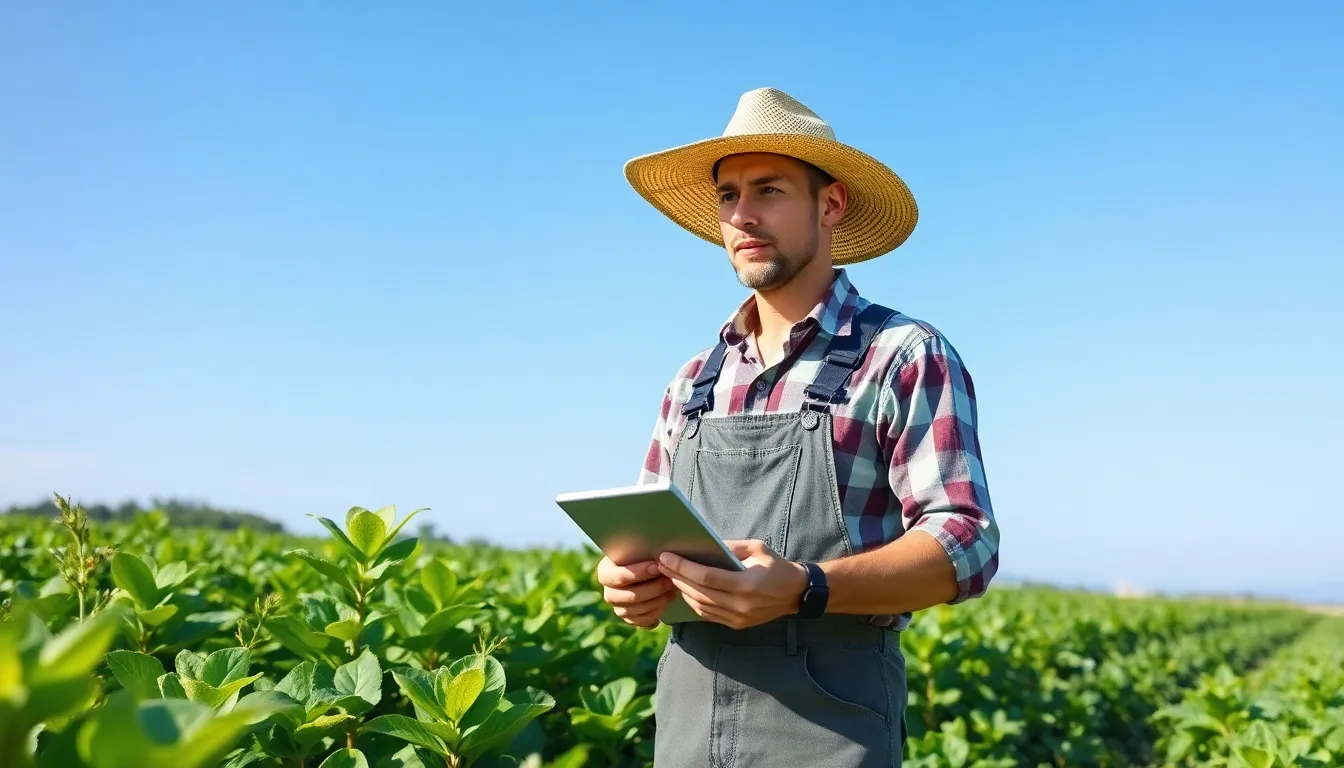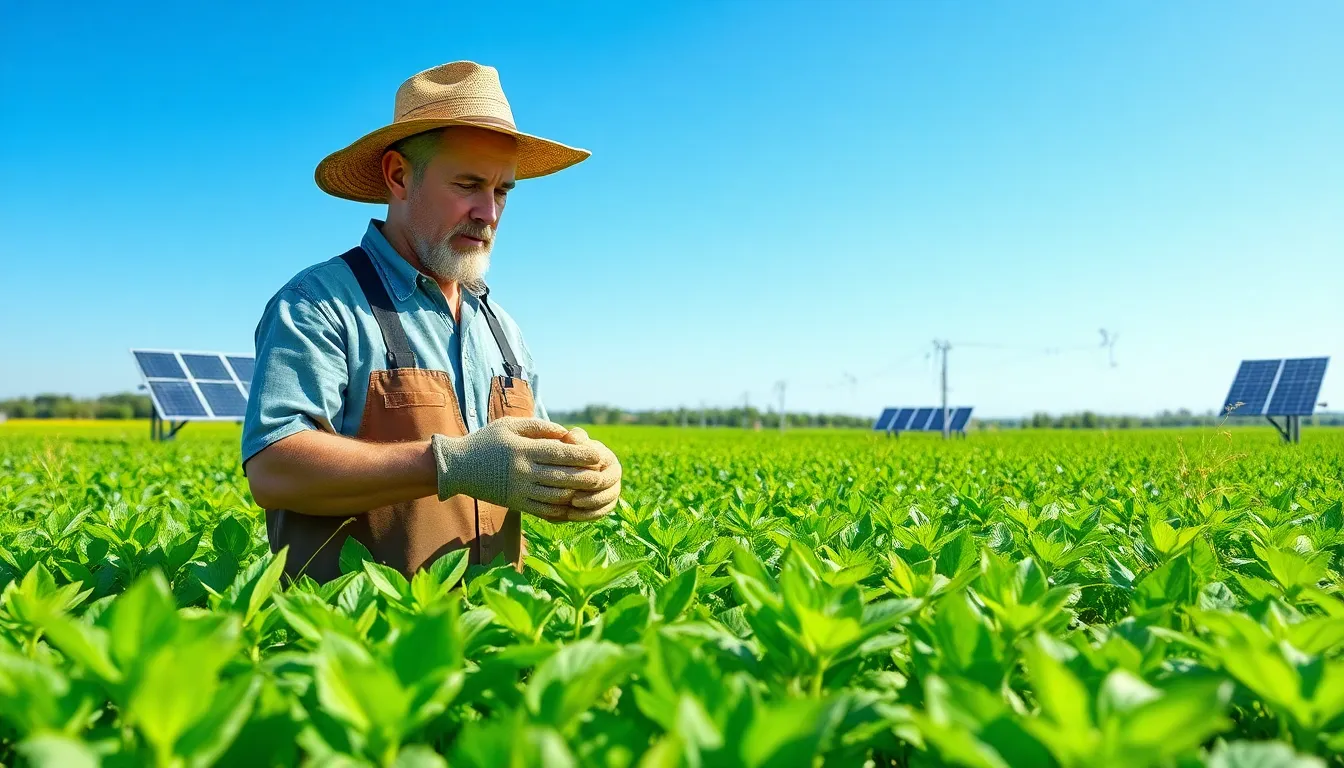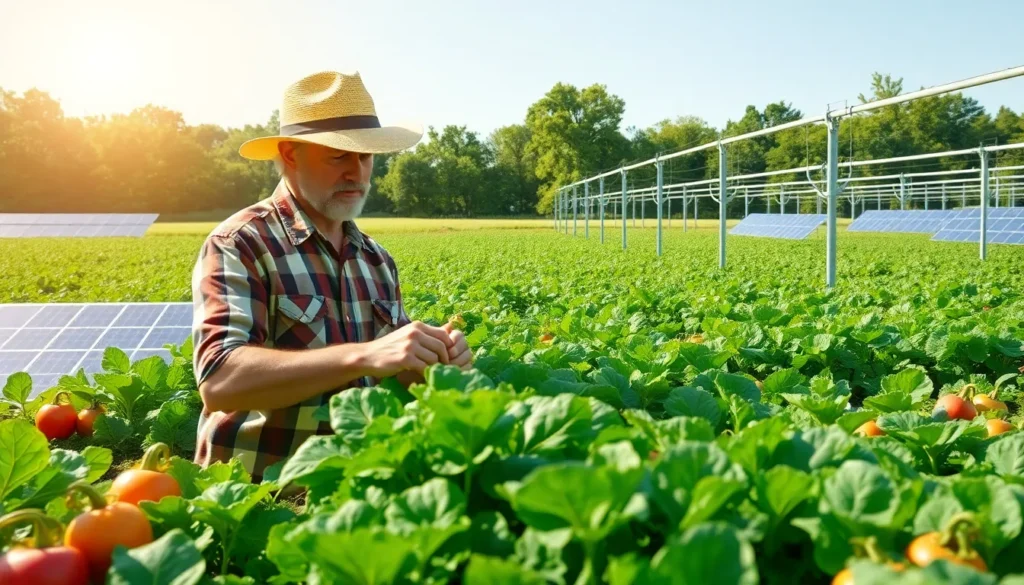Table of Contents
ToggleImagine a world where farming doesn’t just feed the belly but also nurtures the planet. Sustainable farming technology is the superhero of agriculture, swooping in to save the day while keeping Mother Earth happy. With innovations that make crops thrive and resources last, it’s like giving farmers a magic wand—only this wand is powered by science and a sprinkle of eco-consciousness.
Overview of Sustainable Farming Technology
Sustainable farming technology encompasses various innovative practices that enhance agricultural efficiency while minimizing environmental impact. Precision agriculture exemplifies a key aspect of this technology, utilizing GPS and data analytics to optimize crop management. Eco-friendly pest management systems also play a vital role, reducing chemical reliance and promoting biodiversity.
Vertical farming presents another significant advancement. It allows farmers to grow crops in stacked layers, maximizing space and reducing the need for land. Hydroponic systems contribute to this trend by using nutrient-rich water instead of soil, leading to more efficient water use. These methods often yield higher crop quantities in urban settings.
Renewable energy sources, such as solar and wind power, support sustainable farming by providing clean energy for agricultural operations. With advances in battery storage technology, farmers can store energy for use during non-sunny or windless periods. Additionally, innovative irrigation technologies conserve water resources, addressing one of agriculture’s pressing challenges.
Soil health management techniques enhance nutrient cycling and carbon sequestration. Practices like cover cropping and reduced tillage enrich soil fertility, promoting healthier ecosystems. Regenerative agriculture further focuses on restoring soil health and increasing resilience against climate change.
Data-driven decision-making tools facilitate improved farm management. They analyze historical data, crop performance metrics, and market trends to aid farmers in making informed choices. This technology not only boosts productivity but also aligns with the principles of sustainability, fostering a balanced relationship between agriculture and nature.
Benefits of Sustainable Farming Technology


Sustainable farming technology provides numerous advantages for agriculture. This section explores key benefits: environmental impact, economic advantages, and social benefits.
Environmental Impact
Sustainable farming technology significantly reduces greenhouse gas emissions. Implementing precision agriculture lowers water usage and minimizes chemical inputs. Renewable energy sources, such as solar power, further decrease reliance on fossil fuels. Biodiversity thrives when farmers utilize eco-friendly pest management solutions, promoting healthier ecosystems. Improved soil health emerges through practices like cover cropping and reduced tillage, enhancing carbon sequestration. Increased resilience to climate change results from regenerative agriculture techniques.
Economic Advantages
Cost savings are substantial when using sustainable farming technologies. Enhanced efficiency in resource use leads to reduced operational expenses. Data-driven decision-making tools enable farmers to optimize yields and minimize waste. Higher crop yields contribute directly to increased profitability, providing farmers with better market competitiveness. Investment in sustainable practices often results in accessing premium markets that prioritize eco-conscious products. Long-term economic sustainability fosters farm viability, allowing future generations to continue essential agricultural practices.
Social Benefits
Community engagement increases as sustainable farming practices enhance local food systems. Healthier food production results from reduced chemical use, improving public health in surrounding areas. Job creation emerges through new technologies and practices, providing opportunities in rural economies. Educational programs about sustainable techniques encourage collaboration among farmers and researchers. Improved quality of life in farming communities stems from a focus on sustainability, fostering stronger relationships among neighbors. Enhanced food security arises as diverse, resilient agricultural systems meet local needs.
Types of Sustainable Farming Technology
Sustainable farming technology encompasses various innovative practices that enhance agricultural productivity while protecting the environment. Below are key types of sustainable farming technology.
Precision Agriculture
Precision agriculture utilizes GPS technology and data analytics for optimized crop management. Farmers can monitor soil health, crop growth, and weather patterns to make informed decisions. By applying inputs like fertilizers and pesticides more accurately, they minimize waste and environmental impact. This targeted approach leads to increased efficiency and higher crop yields. Advanced sensors and drones also contribute by providing real-time data and aerial views of the fields. When farmers leverage this technology, they achieve sustainable practices along with economic benefits.
Renewable Energy Sources
Renewable energy sources like solar panels and wind turbines play a significant role in sustainable farming. These technologies provide clean, renewable power for farm operations, reducing reliance on fossil fuels. Energy generated from these systems can power irrigation systems, heating for greenhouses, and other on-farm equipment. By integrating renewable energy, farmers cut operational costs and diminish their carbon footprint. Additionally, battery storage solutions allow farmers to store energy for use during unfavorable weather conditions. Transitioning to renewable energy supports a more sustainable and resilient agricultural system.
Water Management Systems
Water management systems address the critical challenge of conserving water resources in agriculture. Technologies such as drip irrigation and rainwater harvesting enhance water efficiency and support crop growth. Drip irrigation delivers water directly to the plant roots, reducing evaporation and runoff. Rainwater harvesting systems collect and store rainwater, providing a sustainable water supply for irrigation. Implementing these systems helps farmers maintain crop health while minimizing water usage. Moreover, innovative monitoring technologies enable real-time assessment of soil moisture levels, ensuring timely irrigation decisions. Efficient water management fosters sustainable farming practices and secures water resources for future generations.
Challenges in Implementing Sustainable Farming Technology
Implementing sustainable farming technology faces several significant challenges. Addressing these obstacles ensures effective transitions to greener agricultural practices.
Financial Barriers
Financial barriers significantly hinder farmers’ adoption of sustainable farming technology. High initial investment costs deter many from investing in precision agriculture or advanced irrigation systems. Cash flow constraints often prevent farmers from pursuing innovative practices, even when long-term benefits exist. Access to funding programs or grants typically remains limited, impacting smaller farms more heavily. Furthermore, fluctuating market prices create additional uncertainty, complicating financial planning for new investments. Overcoming these financial challenges requires collaborative efforts from government and private sectors to facilitate access to capital and resources.
Technological Adoption
Technological adoption presents another considerable challenge for sustainable farming. Many farmers struggle with incorporating new technology into traditional practices. Resistance to change often leads to hesitance in trying precision agriculture tools and data-driven decision-making systems. Training and education on these technologies remain crucial for successful integration. Additionally, insufficient internet connectivity in rural areas restricts access to information and real-time data analysis. Addressing these issues necessitates targeted initiatives that emphasize education, outreach programs, and partnership opportunities, enhancing farmers’ ability to navigate the technological landscape.
Future Trends in Sustainable Farming Technology
Innovative developments are set to shape sustainable farming technology over the next decade. Autonomous systems like drones and robots are becoming integral in monitoring crop health and performing tasks such as planting and harvesting. These technologies reduce labor costs while enhancing efficiency.
The use of artificial intelligence (AI) and machine learning is increasingly prevalent. Data analytics systems analyze vast amounts of information from various sources, optimizing decision-making processes. This shift towards data-driven agriculture facilitates precision farming, enabling farmers to apply resources more efficiently.
Vertical farming continues to gain traction in urban areas. These systems allow for year-round crop production regardless of external weather conditions. As cities expand, leveraging limited space for food production becomes essential.
Biotechnology advancements contribute significantly to future trends. Genetic modifications can enhance crop resilience against pests and diseases, resulting in higher yields. Furthermore, plant-based solutions are emerging as alternatives to chemical fertilizers, promoting environmental sustainability.
Water management technologies are also evolving. Smart irrigation systems equipped with sensors monitor soil moisture levels, ensuring precise water usage. This advancement mitigates water waste, addressing growing concerns about water scarcity.
In energy, integration of renewable resources remains pivotal. Solar panels and wind turbines provide sustainable power solutions for farming operations. Battery storage technologies are making it possible to harness energy even during periods of low production.
Adoption of these trends requires a commitment to training and education. Access to workshops and resources equips farmers with the skills necessary to implement new technologies. Collaborative efforts among stakeholders can streamline this transition, ensuring sustainable farming technologies thrive in the future.




